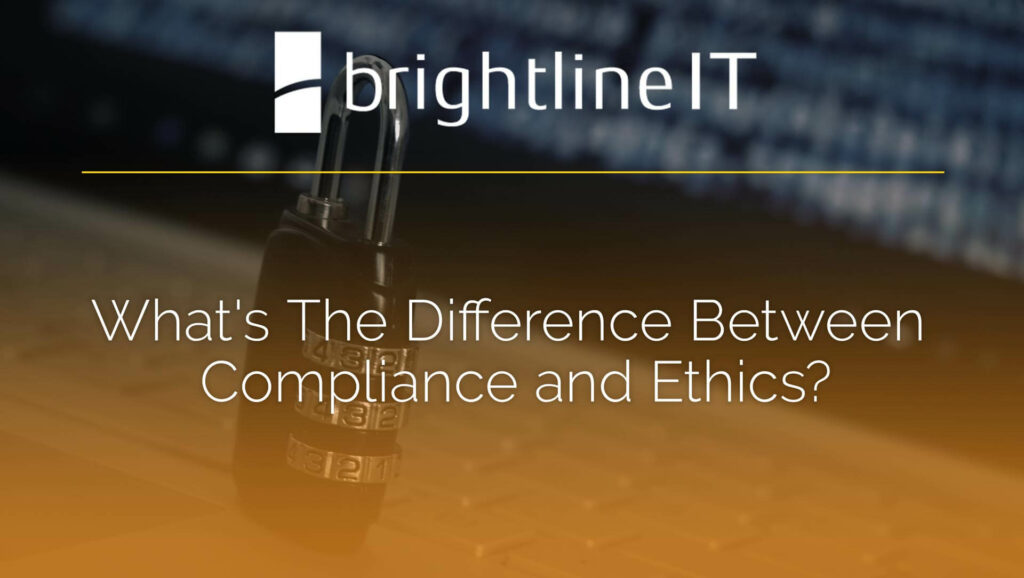What’s The Difference Between Compliance and Ethics?
As we celebrate Compliance and Ethics Week, we have been thinking about some of the confusion that many people have about the roles that ethics and compliance play in organizations. In this article, we discuss the difference between compliance and ethics, and how they work together and separately at the same time. We also share some thoughts for those business leaders who are grappling with how to implement compliance and ethics throughout their organizations.
Strict Definitions Will Help
On the surface, compliance and ethics may seem to be interchangeable words. They encompass many of the same aspects and both weave themselves into the fabric of organizational cultures and business practices. However, they are quite different: Compliance is about meeting or exceeding standards set by an outside entity (for example Cyber-AB which enforces cybersecurity standards for Defense contractors); Ethics is about doing what is right even when no one else is looking.
The following precise definitions will help you understand:
- Compliance is being subject or susceptible to something. It often entails showing deference or obedience to a set of rules. For instance, you “comply with” laws by following them.
- Ethics are moral principles that govern a person’s or group’s behavior. They deal with what is good/right and bad/wrong behavior. An ethical leader will know right from wrong.
How Compliance and Ethics Work in Tandem
When both compliance and ethics are present in an organization, it can be very beneficial for employees and customers alike. However, when you have only one or neither, things tend to get messy: An example would be if the standards were high enough to make employees follow ethical standards, but insufficiently stringent to meet compliance requirements; thus creating a culture where all correct actions might technically be ethical in nature, but they would not comply with local or international regulations.
Similarly, if the compliance standards were so low that there was no incentive for employees to act ethically, then that could lead to a culture of self-preservation and ignorant selfishness where all ethical actions are technically legal; however not particularly beneficial to customers.
A good example of the distinction between these two is illustrated through an experiment conducted by Burger King. Prior to 2002, Burger King had its own standard for animal welfare which was stricter than current federal standards of the time. However, when Burger King decided to do away with this policy and switch over to complying with the federal standards instead of trying even harder despite them, many of their customers did not approve.
This was because customers saw that Burger King’s actions were legally in compliance with the regulations, but ethically and humanely lacking. Therefore, it is important for companies to find a line between complying with regulations and acting ethically when they cannot meet both at the same time. This way, employees know what is expected of them without sacrificing business or personal ethics.
The best way to ensure that this happens is by ensuring that company leaders are not only familiar with the differences between compliance & ethics but also cognizant of them as well. Leadership should be aware enough to understand which one should be prioritized over the other depending on what kind of goal needs to be accomplished.
The Importance of Ethics within a Compliance Program
While having a compliance program is sufficient for complying with laws and regulations for your industry, you are at risk of falling short of meeting your compliance goals without a strong code ethics. Therefore, no compliance program should be considered complete without a developed code of ethics.
The main purpose of including a code of ethics within a compliance program is to avoid engaging in any wrongdoing. By having all employees aware of what is considered ethically correct, the company has less chance of violating laws or causing harm.
A code of ethics is an important part in any business’s compliance program because it provides a set of rules to follow so that all employees know what is expected of them. It also helps avoid the chance for people within the company from engaging in unethical behavior without being aware of it. If a code of ethics is not included in a compliance program, it could lead to an increase in misconduct and other issues.
The Brightline Technologies Approach
As noted above, organizations can be compliant without being ethical. At Brightline IT, we make a conscious decision to strive for both simultaneously. By doing the right thing AND complying with all the rules defined within our compliance program, we are not only doing right by our customers and end users, but we’re also mitigating our risk of being penalized or liable for any damages that can occur due to non-compliance or unethical actions.
What We’re Doing for Compliance Week
At Brightline Technologies, Inc. we are providing our employees and our clients with daily “compliance & ethics focused” informational memos, and inspirational quotes to assist in keeping compliance and ethical behavior top of mind every day. We will be utilizing our social media platforms to inform our social connections that this is a week to think about how they involve their own compliance and ethical standards in everyday life. Brightline will be holding a Jeopardy-type quiz game for its employees at a full staff meeting that Friday where employees will have a chance to win prizes. Being a full-service IT service provider that also includes Cybersecurity and Compliance Consulting services, we foster a culture to practice what we preach and we look forward to celebrating with our employees and clients.
